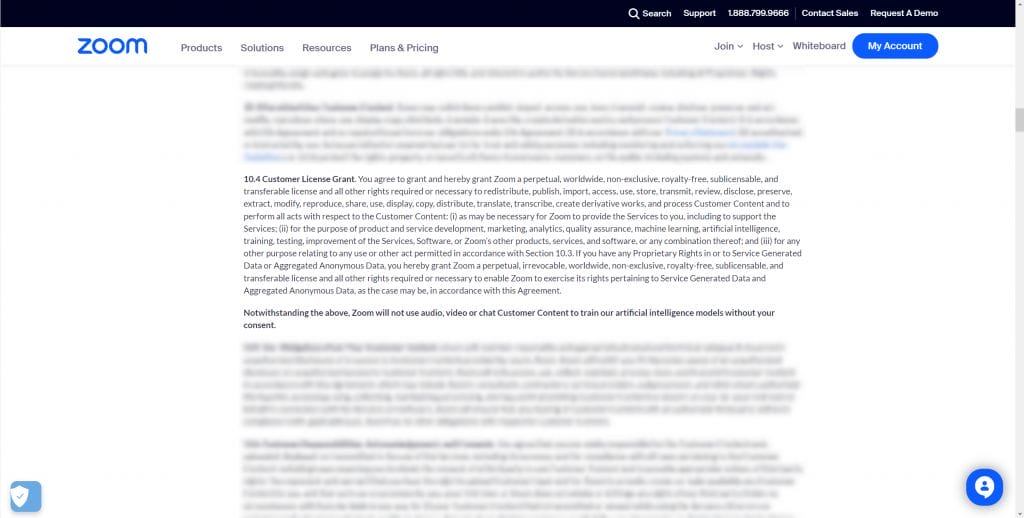Zoom, the company behind the ubiquitous teleconferencing app, is under fire once again. This time, due to a few updates to their platform’s terms of service (you know, that massive block of text that most people skip right past.) Effective yesterday, these changes grant the company broad rights over the use (and potential misuse) of customer data – all to better train their latest AI features.
One passage of the updated TOS in particular, Section 10.4, states that users must “agree to hereby grant Zoom a perpetual, worldwide, non-exclusive, royalty-free, sublicensable, and transferable license and all other rights required or necessary to redistribute, publish, import, access, use, store, transmit, review, disclose, preserve, extract, modify, reproduce, share, use, display, copy, distribute, translate, transcribe, create derivative works, and process Customer Content.“

It’s a broad license to say the least. Unsurprisingly, the update went viral among data privacy advocates and general users alike, calling the new terms “overreaching”. But what exactly is the deeper context here? Here are the five things you need to know about Zoom’s latest controversy.
#1 These changes are related to Zoom’s new AI offerings.
The changes to Zoom’s TOS pertain to its latest AI features and how user data is used to make these offerings possible. For many, this might seem a fair trade-off. You let the company peer into your usage habits and in return you get two shiny new tools to supercharge your productivity workflows. Where the problem lies is the extremely broad terms Zoom lays out for these tools, allowing them to use service generated data for “any purpose”.
Zoom makes it clear, however, in their TOS that the company will not use audio, video or chat content to train artificial intelligence models without consent. More on this later.
#2 This AI enables automatic meeting summaries and enhanced chat
Armed with all this data (and the necessary consent from users), Zoom is offering two features to all users:
- Zoom IQ Meeting Summary: This feature “observes” your meetings and then automatically produces summaries based on what it “understood”.
- Zoom IQ Team Chat Compose: This chat composition feature suggests auto-generated responses inside your meeting chat, based on the context of the conversation. Like the Meeting Summary feature, it looks for patterns learned from previous chat data to suggest relevant and coherent responses.
In both cases, Zoom is using generative AI to not only analyze data, but actively create new content based on what it’s analyzing. This type of artificial intelligence is the latest Silicon Valley gold rush, enabling platforms to “learn” patterns from vast amounts of data and then use this knowledge to produce something new that wasn’t in the original dataset.
#3 People are very concerned about how their data is being utilized here.
Because generative AI requires so much data to properly train, it makes sense that Zoom is rolling these features out on a free trial basis. By onboarding users as quickly as possible and securing their consent to use the data, they’ll be able to fine-tune a powerful AI toolkit, ready for commercial launch in the near future.
It’s important to note here that Zoom isn’t hacking into your webcam and watching you space out during work calls. The company makes it clear what types of data they’ll be analyzing, and what they’ll be used for. But the way the TOS are crafted mean they don’t necessarily need to stop there. The backlash to this entire initiative primarily stems from the perception that Zoom is asking for way more than they need to train these AI tools.
#4 Zoom wants to make it clear that user consent is key.
In response to the backlash, Zoom’s Chief Product Officer, Smita Hashim, reiterated that the company does not plan to use customer content, or audio or video, to train its models without first receiving consent from the user. There’s that magic word again. Account owners and administrators first have to opt in for these features to work. When these features are enabled, meeting guests are notified that data is being collected when they join the call, just like the notification they receive when meetings are being recorded.
But once consent is granted, the TOS allows Zoom to utilize data in whatever way they seem fit. To be clear, this is not a unique ask on Zoom’s part. Nearly every app or smart device on the market today requires some sort of data collection to function. Just the other week, I bought a desk lamp that apparently needed access to my microphone and contacts in order to turn on. This lamp now lives in a drawer.
#5 Companies are asking for a lot. Consumers don’t always have to agree.
As with any contract, the devil is in the details. With all the ways artificial intelligence can leverage data to create exciting new services, the complexities around data use and proper stewardship are growing exponentially by the quarter.
Companies have every incentive to maximize their use of data for AI training. These investments can lead to better user experiences, market leadership, and potentially increased revenues. It’s a no-brainer. But is it a win-win for these companies and their customers?
The answer is, as always: It depends. Our data is incredibly valuable. As generative AI takes over industries, that data may soon be the most valuable asset we have. And yet, there is still no meaningful way for consumers to participate in the incredible revenues being raked in from the use of that data.
For many, that idea is untenable and calls for more than a little backlash. But for others, never having to take minutes during work calls again might be well worth the sticker price.


